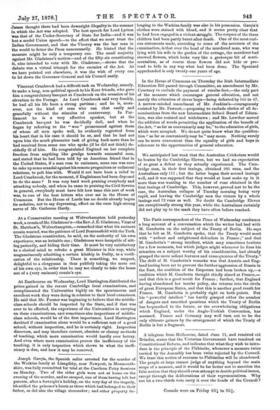The Paris correspondent of the Times of Wednesday continues a
long account of a conversation which the writer had had with M. Gambetta on the subject of the Treaty of Berlin. He says that he felt as M. Gambetta spoke, that the Treaty would meet with "ardent and enlightened defenders in France ;" and that M. Gambetta's "strong intellect, which may sometimes hesitate for a few moments, but which judges aright whenever be fixes his attention on a subject worthy of his consideratiOn, had already grasped the more salient features and consequences of the Treaty." The drift of M. Gambetta's remarks was that Austria and Eng- land having been set to prevent the further aggression of Russia in the East, the coalition of the Emperors had been broken up,—a coalition which M. Gambetta thought chiefly aimed at Franca,— and that this is a good result for France ; further, that England having abandoned her insular policy, she returns into the circle of great European States, and that this is another good result for France. M. Gambetta is probably right on both points. But his "powerful intellect" has hardly grasped either the number of dangers and unsettled questions which the Treaty of Berlin has bequeathed to the future, or the overwhelming obligations which England, under the Anglo-Turkish Convention, has assumed. France and Germany may well turn out to be the only ultimate gainers by the arrangement of which the Treaty of Berlin is but a fragment.


































 Previous page
Previous page